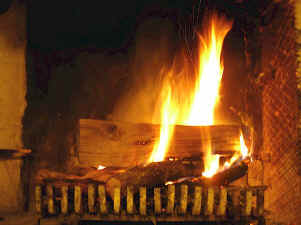 |
ELECTRICITY, WATER AND NATURAL GAS SUPPLIESNormal summer usage of water, gas and electricity is normally included in the price of your rental. There is usually an extra charge for heating and air conditioning, which must be paid locally and is generally a standing weekly charged or based on metered consumption. On occasions, supply of water and electricity can be erratic, particularly in peak summer months when demand is high. Water supply can be interrupted or electrical circuit breakers may trip if, for example, several high wattage appliances are switched on at the same time. · ELECTRICITY IN ITALYElectric power is very expensive in Italy and is therefore
consumed more attentively than in some other countries. For instance, houses have
their supplies set to upper limits of 6 KW (kilowatts) or even 3 KW. This
is the maximum power that can be used at any one time without throwing a
circuit breaker. On average, appliances use the following amounts of power: electric oven (2.5 KW),
washing machine (2.5 KW), dishwasher (3 KW), or iron (2 KW). Each electric bulb uses 60
to 150 watts. If you are staying in
vacation accommodation with several major appliances and plus a water
supply pump, it is essential to stagger electrical use or the electricity will cut out.
If it does cut out, switch off a couple of appliances and push the
circuit breakers back up. Be sure to turn off the lights and especially the
air conditioning, if any, when you go out. · AIR CONDITIONING IN TUSCANYAir conditioning is quite rare in country rentals, indeed almost
anywhere in Italy because of the high cost of electricity and also
because it is not really necessary. If your apartment description does not state that there is air conditioning,
assume there is none. Even without air conditioning, most older buildings have thick walls and are naturally cool. If the weather is hot, keep your apartment cool by
carefully shutting all windows and doors during the day, closing the shutters and drawing the curtains to keep the sun out. Open up in the cool of evening and close everything up again the next morning. · HEATING A VACATION RENTAL IN TUSCANYHeating is very expensive in Italy, whether it is by means of electricity or natural gas, and should be used sparingly. Heating charges are not normally included in the vacation rental price but are payable locally based on the metered consumption. Don't leave the windows open while the heat is on - if you're too hot, turn the heating down or off. Under current regulations, in Tuscany the heating can be used only from November to the end of April for up to 8 hours a day. Outside of this period, it's best to rely on an open fire. Firewood is also likely to be an extra charge but firewood is cheap and plentiful in rural Tuscany as well as making a room more cheery. There is frequently a fireplace in the kitchen if it is of traditional design and not a 'kitchenette'-style cooking angle. · WATER SUPPLY IN TUSCANYWater is a scarce commodity throughout much of Italy south of Milan.
In most cities and towns, the supply rarely fails but in villages and
farm houses during summer, the supply can be interrupted both due to
wells and cisterns drying up and due to pump malfunctions. If that
happens, contact the person in charge. Long experience means the owner
or rep knows how to deal with the problem. Don't leave taps running and
if you see one dripping, let the owner know. It's very easy for a
dripping tap to empty a water cistern in a single night. |
Home
|
Information about the Chianti Classico region of Tuscany, Italy
Website design, website promotion and content management by ammonet
Tuscany Vacation Rentals Copyright © ammonet InfoTech 2005 - 2024. All rights reserved.